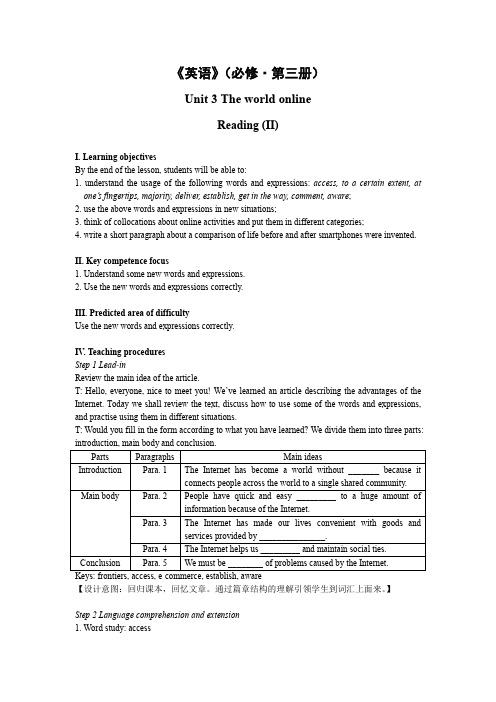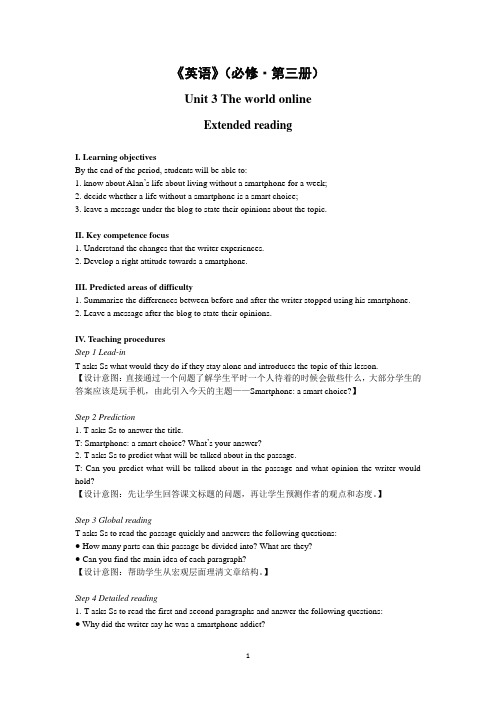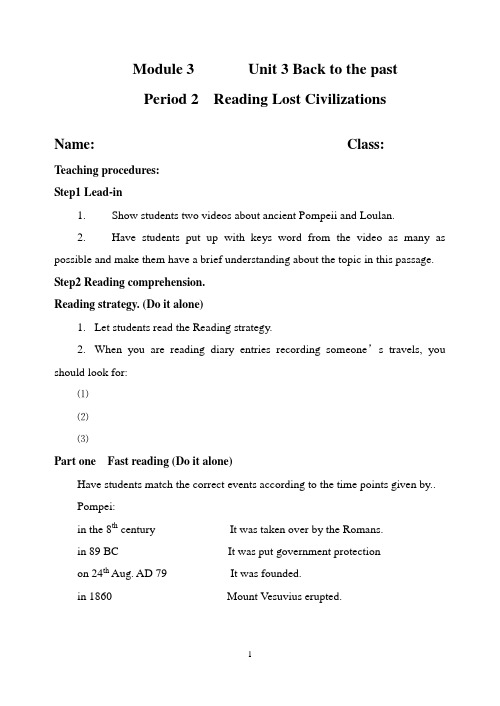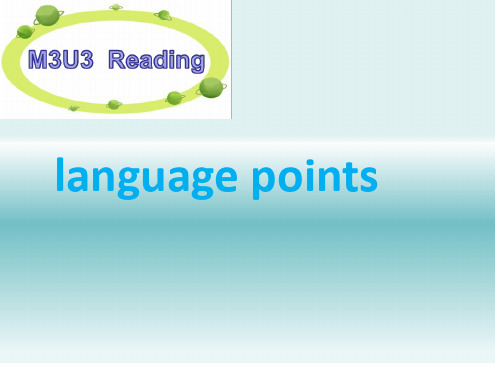译林版高中英语必修三学案M3Unit3Reading第二课时
高中英语《M3 U2 Language 》Reading导学案 译林牛津版必修3

高中英语《M3 U2 Language 》Reading导学案译林牛津版必修3Language 》Reading导学案译林牛津版必修3Teaching aims:1、Get to know more about the development of the English language、2、 Get further understanding of the text and be able to retell some important elements in the development of English、3、 Practice more skills in reading a history article、Teaching procedures:Step1 Warm-upThe teacher starts the lesson with a free talk、Ask the students “How long have you been learning English? What have you learned?” Tell students that they will learn a passage dealing with English and its history、Step2 SkimmingStudents are allowed several minutes to skim the text、 Their skimming is based on the task of questions on page22 concerning the general idea of the text、Step3 Reading for the detailsPresent the questions on page24、 Let the students bear them in mind and listen to the text carefully to find the answers、 Check the answers、1、Why does the English language have so many rules that confuse people? Because it is made up of the grammar and vocabulary that people from different countries and cultures brought with them to Britain、2、 Where did the word English come from? It came from the word Engle, asit was spelt in Old English、3、 Why can words with similar meanings be found in the English language? These words with similar meanings developed because each word came from a different language、4、 Who made the greatest contribution to the development from Old English to Middle English? The French-speaking Normans, who took control of England in1066、5、 Why are many of the words for animals different from those for meat in English? The words for the animals came from Old English, while the words for the meat came from Old French、Step4 Intensive comprehensionAsk the students to pay attention to the subtitles and divide the text into several parts、Thetext can be easily divided into4 parts considering thesubtitles, namely, Introduction, Old English, Middle English and Modern English、Part1 IntroductionRead part1 and find answer to the question “Why English has so many difficult rules?”Because people from many different countries have lived together in Britain and they brought with them the rules and vocabulary into the English language、Part2 Old EnglishPresent a flow chart according to the development of Old English、 The teacher can choose to tell the students some basic facts as well as to ask some detailed questions with reference to the chart、And after completing the chart, students will be encouraged to give a short summary of Old English、 If necessary, the teacher can give an example asfollows:“Today we have learned the development of Old English、 And let me tell you something about it、 Before the middle of the5th century, people spoke Celtic、 Then2 Germanic tribes the Angles, the Saxons occupied Britain、Their language mixed with Celtic and became the base of Old English、 At the end of the9th century, the Vikings, people from countries including Denmark and Norway moved to Britain、 And their language mixed with Anglo-Saxon and became what we now call Old English、 By the10thcentury, Old English was the official language of England、”Ask Ss to think about “Why we feel puzzled about which words or phrases to use?”Part3 Middle EnglishRead part3 and discuss the answer to the question “What are the factors that contributed to the development of Middle English?”French and Henry IV、Have a further discussion within groups about the influence resulting from the factors and make a summary of the factors and the effects、Part4 Modern EnglishStudents are asked to finish reading the last part and find answers to the following two questions:When did Modern English appear?During the Renaissance in the16th century、 (If possible, the teacher could also inform students of some basic information of Renaissance、)What new factors are included in modern English?Latin and Greek words, pronunciations and new words and new ways being invented、Step7 Post-reading consolidationStudents are asked to fill in the blanks of a short passage related to the text、Step8 HomeworkWrite a short summary of English and its history according to what we have learned today、。
译林英语必修3Unit3Reading (共24张PPT)

⑵ facts and historical information ⑶ personal feelings and opinions
Pompeii (庞贝)
2.What did the author see in Pompeii?
streets with stepping stones
houses decorated with wall paintings
What is the text made up of?
5 diary entries
Reading
Date 15th July
16th July
17th July
Arrangements
In Italy
went to a lecture about Pompeii
saw the ancient city of Pompeii, be to visit the museum in Naples
Unit3 Back to the past
Step 1 Lead-in
The Parthenon
The Statue of Zeus
The Taj Mahal
The Hanging Gardens
The Potala Palace
译林版高一英语必修三 Unit 3 The world online L2 Reading 教案

《英语》(必修·第三册)Unit 3 The world onlineReading (II)I. Learning objectivesBy the end of the lesson, students will be able to:1. understand the usage of the following words and expressions: access, to a certain extent, at one’s fingertips, majority, deliver, establish, get in the way, comment, aware;2. use the above words and expressions in new situations;3. think of collocations about online activities and put them in different categories;4. write a short paragraph about a comparison of life before and after smartphones were invented.II. Key competence focus1. Understand some new words and expressions.2. Use the new words and expressions correctly.III. Predicted area of difficultyUse the new words and expressions correctly.IV. Teaching proceduresStep 1 Lead-inReview the main idea of the article.T: Hello, everyone, nice to meet you! We’ve learned an article describing the advantages of the Internet. Today we shall review the text, discuss how to use some of the words and expressions, and practise using them in different situations.T: Would you fill in the form according to what you have learned? We divide them into three parts:【设计意图:回归课本,回忆文章。
译林版高中英语必修三Unit3 Extended reading 教案

《英语》(必修·第三册)Unit 3 The world onlineExtended readingI. Learning objectivesBy the end of the period, students will be able to:1. know about Alan’s life about living without a smartphone for a week;2. decide whether a life without a smartphone is a smart choice;3. leave a message under the blog to state their opinions about the topic.II. Key competence focus1. Understand the changes that the writer experiences.2. Develop a right attitude towards a smartphone.III. Predicted areas of difficulty1. Summarize the differences between before and after the writer stopped using his smartphone.2. Leave a message after the blog to state their opinions.IV. Teaching proceduresStep 1 Lead-inT asks Ss what would they do if they stay alone and introduces the topic of this lesson.【设计意图:直接通过一个问题了解学生平时一个人待着的时候会做些什么,大部分学生的答案应该是玩手机,由此引入今天的主题——Smartphone: a smart choice?】Step 2 Prediction1. T asks Ss to answer the title.T: Smartphone: a smart choice? What’s your answer?2.T asks Ss to predict what will be talked about in the passage.T: Can you predict what will be talked about in the passage and what opinion the writer would hold?【设计意图:先让学生回答课文标题的问题,再让学生预测作者的观点和态度。
牛津译林版必修三M3.U3.reading 公开课导学案

Module 3 Unit 3 Back to the pastPeriod 2 Reading Lost CivilizationsName: Class:Teaching procedures:Step1Lead-in1.Show students two videos about ancient Pompeii and Loulan.2.Have students put up with keys word from the video as many as possible and make them have a brief understanding about the topic in this passage. Step2 Reading comprehension.Reading strategy. (Do it alone)1.Let students read the Reading strategy.2.When you are reading diary entries recording someone’s travels, you should look for:⑴⑵⑶Part one Fast reading (Do it alone)Have students match the correct events according to the time points given by..Pompei:in the 8th century It was taken over by the Romans.in 89 BC It was put government protectionon 24th Aug. AD 79 It was founded.in 1860 Mount Vesuvius erupted.Loulan2000 years ago It was discovered by a Swedish explorer.from AD 200 to AD 500 It existed as a commercial city.100 years ago It was covered over gradually by sand-storms.Part two Further readingExercise one(Do it alone)1,From the passage, we can learn that ______.A. Ann traveled many places in eleven days.B. Pompeii had been a rich city before the Romans took over it.C. Pompeii and Loulan were both discovered in the 18th century.D. some houses in Pompeii were decorated with wall paintings.2. Which of the following is True ? ______A. Sven Hedin was an English archaeologist.B. Loulan was once a small, wealthy commercial city.C. Now a volcano called Vesuvius has disappeared.D. All the people fled from Pompeii before Vesuvius erupted.3. Why was Loulan an important city about 2,000 years ago?A. Because it was a stopping point on the famous Silk Road between the East and the West.B. Because it once a big, rich commercial city with lots of treasures.C. Because there was an ancient water system that ran through the middle of the city.D. Because people have discovered many palaces, temples, workshops and towers in the city.4. The purpose of the passage is to ______.A. tell us a travel experience in Pompeii and Loulan.B. offer us some information about ancient civilizations.C. introduce a cultural expedition to two sites of lost civilizations.D. All of aboveExercise two 语法填空( Cooperative learning)Both Pompeii in Italy and Loulan in China became lost civilizations about 2000 years ago. Pompeii_____(find) in the 8th century BC and was taken over by the Romans in 89BC. ___ 24th Aug.AD79, Mount Vesuvius ___(erupt) and the city were buried ___(live). Loulan was____stopping point on the Silk Road. __ disappeared under the storm. There are just a few _____(ruin) left. Some treasures, such as coins _____ painted pots, was found. ______ the two ancient cities disappeared ______(real) made people regretful..Step 4 Discussion. (Group work)Do you think it important to protect cultural heritage(遗产)?Give your suggestions.Step 5Summary&Homework.SummaryIn this section ,we have learnt the strategy of reading diary entries,such as, dates ,place names and opinions...On the other side, we have a basic understanding for lost civilizations,especially for the brief history of ancient Pompeii and Loulan. We also made some suggestions on how to treat the cultural heritages.Cultural heritages are people's precious wealth, we should try our best to protect them from damaging.Homework:1.Try translating the five diary entries by yourself.2.Finish the exercises of C2 and D1 on page 44.。
译林版高中英语选必三Unit3 Reading II 名校教案

Unit 3 Back to the pastReading◆内容分析:【What】本板块语篇的话题为“海上航行”。
两篇历史文章围绕“海上航行”这一话题展开,分别介绍了明朝航海家郑和七下西洋的故事以及意大和航海家哥伦布发现新大陆的相关情况。
【Why】本文通过对两位航海家的相关介绍,引导学生关注历史人物,分析历史事件,促进人文素养的提升;同时,了解中国对外的积极影响、感悟中华文明在世界历史中的重要地位,增强民族自豪感。
【How】本文的语篇类型为说明文。
文章结构分明,条理清晰,逻辑缜密,语言精炼。
文章按照时间发展顺序展开论述,主题突出,内容详实,评价中肯。
第一篇文章以郑和首次远航开篇,重点强调第一次航行的规模之大,突出中国古代先进的航海和造船技术。
第二篇文章聚焦哥伦布第一次航海过程中遇到的挑战,体现哥伦布作为航海家敢于冒险和勇担责任的优秀品质。
文章运用各类事实信息,增强了论述的说服力。
◆教学目标:By the end of this section, students will be able to1. understand the usage of the key words and expressions:2. use the above words and expressions in new situations;3. have a better understanding of the spirit of exploration and demonstrate this spirit in their daily lives.◆教学重难点:1. Understand some new words and expressions;2. Be able to use the new words and expressions correctly.◆教学过程:Step 1 Lead-inListen to the passage and underline the following key words and expressions.Step 2 Building vocabulary1.Word study: navigatev. to find your position and the direction you need to go导航;v. to sail along, over or through a sea 航行,航海v. to find the right way to deal with a difficult situation 找到正确的方法navigate-navigation-navigator●Practice makes perfect.●The river became too narrow and shallow ___________(navigate).●His father is an expert in ____________(navigate).●He became a _____________(navigate) during the war.2.Word study: loadn. sth that is being carried by a person, vehicle, etc.负载,负荷n. a feeling of responsibility or worry (责任或忧虑的)沉重感v. to put a large quantity of things or people onto or into sth 装上,装入v. to put a bullet in a gun 装子弹/弹药load sth into/onto sth把...装入/上...load sth with sth 把...装入...a load of/loads of...大量的...●Practice makes perfect.●We finished ___________(load) and set off.●She loaded film _________ the camera.●She loaded the camera _______ film.●She thought she would not be able to bear the load of bringing ________ herfamily alone.●_________________(know) that they had arrived safely took a load off my mind.●He carried a ___________(load) gun.3.Word study: compass(n.) an instrument for finding direction, with a needle that always points to the north 罗盘,指南针compasses 圆规4.Word study:logn. a piece of a thick branch or of the trunk of a tree 木柴,原木n. an official written account of what happens each day 日志v. to record sth officially in writing or on a computer 把...载入日志keep a log/logs of...记录...写日志log in/on 登录,注册log off/out 退出,注销5.Word study:chartn. a page or sheet of information in the form of diagrams 图表n. a detailed map of the sea 海图v. to make a map of the area or show the feature in it 绘制地图v. to record or follow the progress or development of sb./sth. 记录,跟踪v. to plan a course of action 制定计划6.Word study: harmoniousadj. friendly, peaceful and without any disagreement 和谐的,和睦的harmony-harmonious-harmoniouslybe in harmony with sth 与...和谐相处●Practice makes perfect.●The only way for us to survive is to live ________ harmony with nature.●In short, a good and ________________(harmony) environment at home isnecessary for a child to grow healthy.●I firmly believe that human should live with nature __________________(harmonious).●Their harmonious relationship resulted ________ their similar goals.7. Word study: dismissv. to decide that sb./sth.is not important and not worth thinking or talking about 不予考虑,对...不屑一提v. to put thoughts or feelings out of your mind 摒除(思想、感情等)v. to officially remove sb from their job 解雇v. to send sb. away or to allow them to leave 解散dismiss sth as...把某事当成...不予考虑dismiss-dismissal●Practice makes perfect.●We can safely dismiss what he said _________ a joke.●_______________________________(dismiss) her fears, she climbed higher.●At 12 o’clock, the class ___________________(dismiss).●He was so ___________________(responsible) that I decided to dismiss him.●He still hopes to win his claim against the unfair ____________(dismiss).8. Word study: influentialadj. having a lot of influence on sb./sth. 有很大影响力的be influential in sth. /doing sth.influence-influential●Practice makes perfect.●He had been influential _________ shaping economic policy.●She is one of the most ______________ (influence) figures in local politics.●What exactly is the influence of online games __________ teenagers?9. Word study: graven. a place in the ground where a dead person is buried 坟墓adj. very serious and important 严重的,深切的adj. serious in manner 严肃的,表情沉重的grave-gravityfrom the cradle to the grave 一生●Practice makes perfect.●The consequences _______________(be) very grave if nothing is done.●The police have expressed grave concern about the missing ____________(child)safety.●Have you realised the __________(grave) of the situation?●Learning should be a never-ending process, from the cradle _______ the grave.10.Word study: subsequentadj. happening or coming after sth. else 随后的,后来的subsequent-subsequently-subsequence●Practice makes perfect.●Developments on this issue _______________(deal) with in a subsequent reportto be issued in the near future.●____________________(subsequent), new guidelines were issued to allemployees.●The early memories are likely _________________(lose) in subsequent years.11.Phrase study: allow forallow for:使成为可能;考虑到,把...计算在内试译:It will take about two hours to get there, allowing for traffic jams.考虑到交通堵塞,到那里大约需要两个小时。
高中英语译林牛津版必修三第三单元Reading第2课时language points共30张

arrange sth. 整理,布置;安排,筹备
arrange to do sth.
安排做某事
arrange sth. for sb.
为某人安排某事
arrangement
n. 安排,筹备
make arrangements for 安排......
(1) 他已安排我去参加会议。 He's _a_r_ra_n_g_e_d_fo_r__m_e_t_o_a_tt_e_n_d__ the meeting.
neither/nor+be 动词/助动词/情态动词+主语, 用于否定句中。表示“某人或某物也不......”。
I don't like chatting on with strangers online. Neither/Nor does Mary .
(1). --My room gets very cold at night. -- ________. A. So is mine B. So mine is C. So does mine D. So mine does (2). --David has made great progressrecently. --_______, and _______. A. So he has, so you have B. So he has, so have you C. So has he, so have you D. So has he, so you have
(2) ---Did you tell Julia about the result?
--- Oh, no, I forgot. I ____ her now.
A. am calling B. will call
- 1、下载文档前请自行甄别文档内容的完整性,平台不提供额外的编辑、内容补充、找答案等附加服务。
- 2、"仅部分预览"的文档,不可在线预览部分如存在完整性等问题,可反馈申请退款(可完整预览的文档不适用该条件!)。
- 3、如文档侵犯您的权益,请联系客服反馈,我们会尽快为您处理(人工客服工作时间:9:00-18:30)。
人本跨界大课堂自主学习型英语学道
堂组姓名编号M3 unit3(02) 日期2017-04- 07 主备校长备课组高一英语组
【佳句欣赏】(大声朗读三遍):Easier said than done.说的容易,做到难。
【自研课导学】(时段:晚自习)
预习内容及目标:预习课本P42-43的内容,重点预习本文章生词、熟悉短语和难点句型。
【晨读课】 1. 熟读unit3的单词
2. 大声朗读P42-43页课文
【展示课导学】
(一)学习内容:M3 Unit 3 Back to the past Reading 第二课时
(二)学习主题:1.能够熟读全文。
2. 深入理解文章,掌握文章中的难点单词、短语和句子。
(三)定向导学·互动展示
【训练课导学】1.时段:晚自习 2.时间:20’ 3.训练方式:独立,自主完成
“日日清过关”巩固提升三级达标训练题
姓名自评:师评:批阅日期:
一、基础题翻译
1. 赢得这次旅行的一席之地
2. 夺取
3. 听讲座
4. 从……喷涌而出
5. 被活埋
6. 造成很大的损失
二、提高题选择合适的词填空
1 alive/ lively
a The local people were so happy to find the missing boy in the forest.
b Susan is a(n) young lady, who always makes people around her smile.
2 take over/ take out
a When digging the new underground line, a worker saw something in a hole. He
reached in his hand and a small statue of an ancient soldier.
b According to the manager, the business plan will help the company
other small business, so they can become the number one company in the country.
3 find/ found
a Harvard University was in 1636 and named after John Harvard, who
left his library to the school after his death.
b George:How did you like the film last night?
Rebecca: I it really interesting. In fact, it is one of the best films I have ever seen.
4 paint/ draw
a Don’t touch the door please! It was this morning.
b a line under the words which you do not recognize.
三、发展题:用所给单词的正确形式填空
【学生自主反思】(精题选编, 错题纠正, 今日一得等)
1. I hope you weren’t by anything that your brother said.
2. , you were out when we called.
3. Several secret went missing from the government’s information department.
4. All the large houses have been pulled down, or as nursing homes.
5. On the table were the of the evening meal.
6. He founded the charity his late wife.
7. Smoke and flames came out of the volcano as it , which looked very terrible.
8. Will the government its promise to reform the law?
9. The two children want to their mother’s bedroom with these roses.
10. It is important that students should attend all the given by our headmaster.
今日心得:
今日不足:
【培辅课】(时段:附培辅单)
疑惑告知:
效果描述:。
